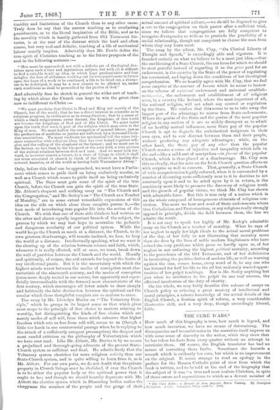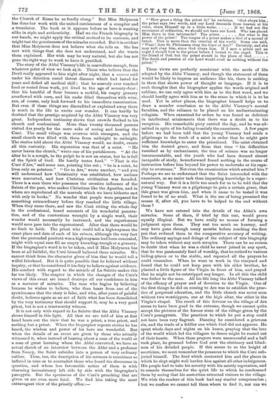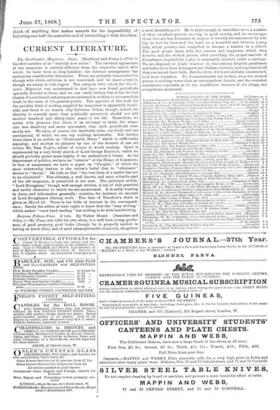THE CURL D'ARS.* How much of this biography is true,
how much is legend, and how much invention, we have no means of determining. The discrepancies and inconsistencies in the narrative itself impress ua with some sense of sincerity in the writer, while they show that he has taken his facts from every quarter without an attempt to scrutinize them. Of course, the English translator has had no means of correcting these faults. Sometimes she hazards a remark which is evidently her own, but which is no improvement on the original. It seems strange to read an apology in the preface for the Roman Catholic point of view from which the book is written, and to be told at the end of the biography that the subject of it was " a trite and most zealous Christian, in spite of those errors and superstitions to which as a devout member of
• The Cure ci 'Ars: a Memoir of Jean Baptiste Marie Vianney. By Groorgina Molyneux. 2 vols. Saunders, Otley, and Co. 1868.
the Church of Rome he se fondly clung." But Miss Molyneux has done her work with the united carelessness of a compiler and a translator. The book as it appears before us here is wanting alike in style and authenticity. Had we the French biography in our hands, we might apply the critical method to its contents, and might test the genuineness of the miracles recorded. But it is evident that Miss Molyneux does not believe what she tells us. She has met with things that she does not understand, and she wants them explained. Her wish may be very natural, but she has not gone the right way to work to have it gratified.
The story of the Abbe Vianney's life is marvellous enough, from whatever point of view we look ilk it. Those who believe that the Devil really appeared to him night after night, that a novena said under his direction cured throat diseases which had lasted for years and defied all medical skill ; that he scarcely ever touched food or rested from work, yet lived to the age of seventy-four ; that his handful of flour became a sackful, his empty granary overflowed with corn, and his casks filled themselves with wine, can, of course, only look forward to his immediate canonization. But even if these things are discredited or explained away there is much in the life to excite our wonder. It can hardly be doubted that the prestige acquired by the Abbe Vianney was very great. Independent testimony shows that crowds flocked to his church and confessional. More than twenty thousand persons visited Ars yearly for the mere sake of seeing and hearing the Care. The small village was overrun with strangers, and the small church was filled with them from midnight to midnight. The stories told about the Abbe Vianney would, no doubt, create all this curiosity. His reputation was that of a saint. " He never leaves the church," wrote one of his parishioners. " At the altar he is a seraph, in the pulpit he is not an orator, but he is full of the Spirit of God. He hardly tastes food." " That is the Cure d'Ars," said some one, pointing him out ; " he is a saint, he lives only on potatoes." " Go to Ars," wrote another, " and you will understand how Christianity was established, how nations were converted, and how Christian civilization was founded. There is a man there who possesses the creative influence of the Saints of the past, who makes Christians like the Apostles, and in whom are reproduced all the marvels which we have hitherto met with only in books." No wonder that people were prepared for something extraordinary before they reached the little village. When they came there, and saw the Cure sitting the whole day in the confessional, heard accounts of his wonderful penetra- tion, and of the conversions wrought by a single word, their wonder would necessarily be increased, and the superhuman would soon pass into the supernatural. After that there would be no limit to faith. The priest who could tell a highwayman the exact place and date of each of his crimes, although the very fact that the pretended penitent was a highwayman had been concealed, might with equal ease fill an empty kneading-trough or a granary. If the biographer's word is to be taken, and if Miss Molyneux has been at all faithful, the Cure himself believed these miracles. We cannot think from the character given of him that he would tell a wilful falsehood. But it is quite possible that he believed without inquiry, or that he considered it his duty to believe against evidence. His conduct with regard to the miracle of La Salette makes this far too likely. The chapter in which the changes of the Cure's views of this event are traced destroys all our confidence in him as a narrator of miracles. The man who begins by believing because he wishes to believe, who then hears from one of the eyewitnesses that the story is false, and who, after years of painful doubt, believes again as an act of faith what has been demolished by the very testimony that should support it, may be a very good priest, but is not a trustworthy witness.
It is not only with regard to La Salette that the Abbe Vianney shows himself in this light. All that we are told of him at first hand bears out the view that he was a priest, a true priest, and nothing but a priest. When the biographer repeats stories he has heard, the wisdom and power of his hero are wonderful. But when the details of an event are given by those who actually witnessed it, when instead of hearing about a man of the world or a man of great learning whom the Abbe converted, we have an actual sketch of an interview between the Abbe and a professor from Nancy, the Saint subsides into a person of very ordinary calibre. Thus, too, the description of his sermons is sometimes so inflated in tone as to contradict those who heard the discourses in question, and whose less favourable notice of them is with charming inconsistency left side by side with the biographer's panegyric. But the specimens of the Cure's preaching that are given us are even more fatal. We find him taking the most extravagant view of the priestly office :—
"'How great a thing the priest is !' he exclaims. God obeys him the priest says two words, and our Lord descends from heaven at his
voice, shuts Himself up in a little wafer If we had not the sacrament of ordination, we should not have our Lord. Who has placed Him there in this tabernacle ? The priest See what is the power of the priest ! The tongue of a priest makes a God of a morsel of bread. This is more than the creation of the world. Some one said,. "What ! does St. Philomena obey the Card of Ars ?" Certainly, and she may well obey him, since God obeys him. If I met a priest and an angel I should bow to the priest before I bowed to the angel. This is the friend of God, but the priest stands in the place of God The death and passion of our Lord would avail us nothing without the priest.' "
These views are perfectly consistent with the mode of life adopted by the Abbe Vianney, and though the statement of them would be likely to impress an audience like his, there is nothing in them that shows power of thought or language. If it is to- such thoughts that the biographer applies the words original and sublime, we can only agree with him as to the first word, and we should hardly agree with him as to the sense in which it is to be used. Yet in other places, the biographer himself helps us to- draw a sounder conclusion as to the Abbe Vianney's mental faculties, and the reliance to be placed on his undiscriminating eulogists. When examined for orders he was found so deficient in intellectual attainments that there was a doubt as to his reception. His remarkable piety carried the day, and he was ad- mitted in spite of his failing to satisfy the examiners. A few pages- before we had been told that the young Vianney had made a pilgrimage to the tomb of a saint in order that he might gain sufficient knowledge to enter the priesthood. The saint obtained him the desired grace, and from that time " his difficulties. vanished as by enchantment, the tree of science was no longer insurmountable, and the youth who had been deemed almost incapable of study, henceforward found nothing in the course of instruction before him beyond his power to undertake or his capa- city to overcome." Not even the examination which awaited him Perhaps we are to understand that the Saint interceded with the examiners, as an easier task than imparting knowledge in a super- natural way. But it is a little too much for us to be told that the young Vianney went on a pilgrimage to gain a certain grace, that this grace was given him, and when it came to be tested it was found to be of no avail. What is the use of being promised the means if, after all, you have to be helped to the end without them ?
We have not entered into the details of the Abbe's own miracles. Some of them, if tried by this test, would prove. equally illogical. But we have really no means of forming a judgment upon them. They rest too much on hearsay, and may have gone through many mouths before reaching the first pen that reduced them to the comparative accuracy of writing. The ordinary sayings and doings of the subject of this biography may be taken without any such scruples. There can be no reason. to doubt that when he was a child he never joined in any sport, that he was passionately fond of worship, that he retired to various hiding-places or to the stable, and repeated all the prayers he could remember. When be went to work in the vineyard and found that he could not keep pace with his elder brother, he planted a little figure of the Virgin in front of him, and prayed that be might not be outstripped any longer. In all this the child was father to the man. All his life long the Abbe Vianney talked of the efficacy of prayer and of devotion to the Virgin. One of the first things he did on coming to Ara was to establish the prac- tice of perpetual adoration, and the little church was never seen without two worshippers, one at the high altar, the other in the Virgin's chapel. The result of this fervour on the village of Ara seems to have been good in the extreme, though we cannot quite. accept the pictures of the former state of the village given by the Cure's panegyrists. The practices to which he put a stop could not have been very flagrant. Dancing he considered a grievous sin, and the trade of a fiddler one which God did not approve. He spent whole days and nights on his knees, praying that the love of the world which led the villagers to dance might be rooted out of their hearts. When these prayers were unsuccessful and a ball took place, he groaned before God over the obstinacy and blind- ness of his deluded people. If this seems to us the height of asceticism, we must remember the penances to which the Cure sub- jected himself. The food which contented him and the places in which he slept might well harden him against all other indulgences. His people had to take his severity with his saintly reputation, and to console themselves for the quiet life to which he condemned them by seeing that his austerities attracted visitors to the village. We wish the readers of this book had any similar compensation ; but we confess we cannot tell them where to find it, nor can we
































 Previous page
Previous page